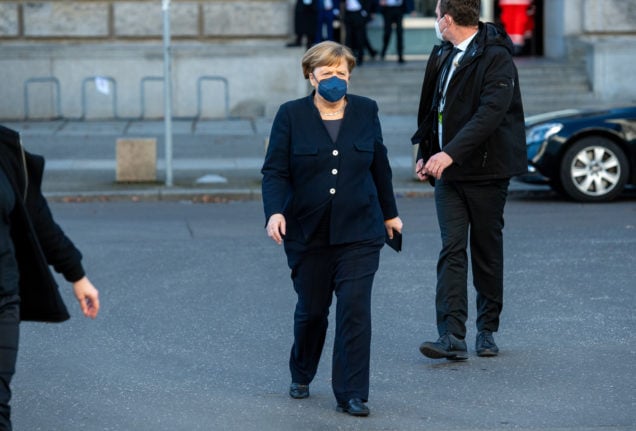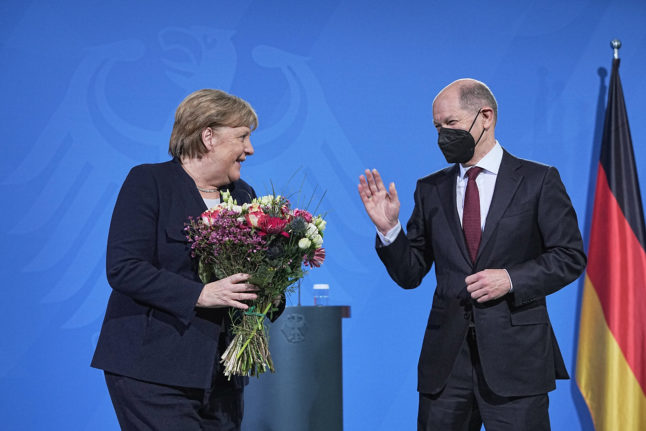The same week she left office this past December, Angela Merkel was Germany’s most popular politician. Leaving with flowers and a 68 percent approval rating, she was one of the few politicians – in any country ever – to successfully engineer a graceful exit from politics on her own terms.
Six months on, Christian Democrat Merkel has mostly kept quiet. On June 1st though, she finally gave her first public speech since leaving the Chancellery. Speaking at a farewell event for the President of the German Trade Union Confederation (DGB), Merkel came out in support of the SPD-led coalition government’s response to Russia’s invasion of Ukraine, as well as the international efforts the US, NATO, G7, and UN are taking to stop Russia’s “barbaric” war.
“My solidarity goes to Ukraine, which has been attacked and invaded by Russia, and to supporting their right to self-defence,” she said. “We should never take peace and freedom for granted.”
Ukraine criticises Merkel’s record
Merkel left office telling Germans to expect a period of silence from her. She maintained she wouldn’t be taking many speaking engagements for a while and would instead focus on writing a memoir of her key political decisions. True to the understated and humble style both Germans and foreigners know her for, she maintained she would mostly write it herself, without a ghostwriter, with help only from her longtime assistant Beate Baumann.

Before her speech, she made just one short public intervention, defending her decision to keep Ukraine and Georgia out of NATO during a summit in April 2008. That decision is just one of many German choices Ukrainian President Volodymyr Zelensky says emboldened Russian President Vladimir Putin to invade his country. Zelensky has levelled sharp criticism at Merkel personally, for everything from her NATO decision to her support for Nord Stream 2, the now cancelled pipeline that would have delivered Russian gas directly to Germany.
“I invite Ms. Merkel and Mr. Sarkozy to visit Bucha and see what the policy of concessions to Russia has led to in the last 14 years,” he said in April, referring to the systematic massacres Russian soldiers conducted in a town near Kyiv.
READ ALSO: Clouds over Merkel’s legacy as Russian invasion lays flaws bare
German Public cools on Merkel’s policies
While there’s no indication in polls conducted so far that Germans blame Merkel for Russia’s invasion of Ukraine, recent surveys show that many now support reversing some of her most key decisions.
During Merkel’s tenure, Germany became dependent on Russia for over half its natural gas imports. The Nord Stream 2 pipeline she supported, if it did become operational, would likely have only added to that dependence. Before Russia’s invasion of Ukraine, ordinary Germans were generally in agreement, with 60 percent supporting Nord Stream 2’s completion. But more than 75 percent now say they want independence from Russian energy, either immediately or step-by-step over the next few months.
Beyond Russia, the German public now seems to want a more distant relationship with another authoritarian country Merkel tried to build closer economic ties with – 83 percent of Germans want the country to gradually become less economically dependent on China.
Again, the real #Zeitenwende isn’t found as much in German government policy as in public opinion. 45% say government reaction to the invasion of Ukraine doesn’t go far enough.
83% want to be less dependent on China—a change which we’re only just beginning to talk about. pic.twitter.com/Eo2ea3Jxm9
— Aaron Gasch Burnett (@AaronGBurnett) April 8, 2022
READ ALSO: An era ends: How will Germany and the world remember the Merkel years?
Merkel hasn’t yet set a release date for her book, but as Russia wages war in Ukraine, a sizeable number of Germans now look prepared to break with some of her most consequential decisions.




 Please whitelist us to continue reading.
Please whitelist us to continue reading.
Member comments